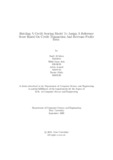Building a credit scoring model to assign a reference score based on credit transaction and relevant profile data
Abstract
A credit score is a numerical expression based on a level analysis of a person's credit
files, to represent the creditworthiness of an individual. The credit score plays a
major role in banks, financial institutions loaning money to individuals for their
personal or business needs. This score is given based on factors such as personal
information, assets, financial behavior and financial history. This system is not digitized
or implemented yet in Bangladesh. So our aim is to build a reliable and robust
credit scoring model which would help institutions like such to have an accurate reference
score to rely on when validating a client. We were able to obtain an optimized
model with an accuracy of( 93%). The model is based on CART(Classification and
Regression Trees) using Gradient Boosting method(GBM). We also proposed a new
hybrid model consisting of a two step architecture. The first one based on distributed
Random Forests, the individual decision tree outputs of which was fed into a Deep
Neural Network(DNN), and trained on to achieve marginally better results than using
only Random Forest approach. Since, credit scoring an individual is a sensitive
issue, it is not ethical to provide a score without proper justification. We conducted
interpret-ability analysis on our model and generated visual representations of the
criterion affecting the output of our model and provide necessary information to analyze
the client efectively. Our results were conclusive and imitated the process of
evaluating an individual precisely. The work-
ow we proposed could be implemented
in production to provide a concrete base for evaluation and prediction of defaulters.
Simultaneously provide a detailed overview of the results obtained. This could help
financial institutions immensely and help them save millions lost by default loans.

